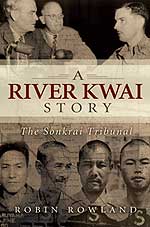This blog was created so I could chronicle my work on my forthcoming book The Sonkrai Tribunal and other writing.
During the CBC lockout I expanded the blog to cover that dispute.
During the lockout, I blogged about a column by Peter Worthington, which claimed "The CBC is notoriously anti-military--except when our soldiers are accidently killed by American bombs' and went on to show how inaccurate that column was.
After the end of the lockout I returned to the original purpose, telling about my book, and occasional personal stuff.
So those are the ground rules. Tonight, as someone who writes about military history, I am going to blog military history.
This morning in The Globe and Mail, television critic John Doyle wrote a column criticizing the CBC National for three Road Stories covering the "Home Front" for the troops in Afghanistan. You will find comprehensive coverage of that specific controversy at Tod Maffin's Inside the CBC.
If someone is going to either support, or criticize the military, or both, it is wise to have a knowledge of military history.
It appears that a lot of the people commenting on the Doyle column, on either side, have absolutely no sense or knowledge of military history.
Anyone who has served in the military (I haven't but I have interviewed scores who have) will tell you either on the record (if it is history) or off the record (if it is current) about the screw ups, foul ups, stupid mistakes made by everyone from privates to full generals, not to mention "chairbourne" politicians.
Some people who wouldn't dream of stereotyping women, gays, people of African descent, Muslims, Jews and even Klingons, seem to think there is no problem in stereotyping everyone who serves in any military.
What about heroes? Barbara Tuchman has described how in the earliest days of the First World War, the British newspapers of the day called all the members of the British Expeditionary Force heroes. Months later, in the blood and mud and lost lives of the trenches, the word hero disappeared from the papers. The American media called every soldier a hero in the first days of the invasion of Iraq, now in that bloody insurgency, the American media hardly uses the word hero anymore.
When the media does use the word hero today it is usually for a good reason, because there are instances of true heroism, as in the case of the first three Canadian soldiers to win combat medals in Afghanistan.
So now to The Sonkrai Tribunal, which is currently scheduled for release in July and is the result of years of academic and journalistic research.
As the son of a man who was a prisoner of war of the Japanese, I heard from my youngest days about the evil of the Japanese. You still hear that on the Far East Prisoner of War mailing lists. For some, the prisoners themselves were simply victims of that evil.
Much of The Sonkrai Tribunal tells how both sides were caught up in one gigantic mess of one mistake after another, mistakes made by both sides. If you read the official accounts, and the memoirs, interview the survivors and, especially as I did, study the complete account of the F Force trial in Singapore 60 years ago in 1946, which is what the book is about, a different picture emerges.
There was Japanese evil, but often there was stupidity, prejudice, arrogance and blindness not only in the POW camps but at the highest command and political levels. There was, of course, a clash of cultures and customs, made all the worse by a language barrier were neither side spoke the other's language.
There were, and later memoirs do recount this, Japanese and Korean guards in that hell hole who were decent human beings.
There are several genuine heroes in the book, Australian and British officers who saved many lives. There were Australian and British officers who shirked their duty, were lazy or just plain stupid and cost the lives of their men. There were "other ranks" who went way beyond the call of any duty to help others survive. There were others whose selfishness or shortsightedness endangered others. Not to mention the majority of poor blokes caught in the middle.
What about the Home Front? Under the rules of the time, prisoners were allowed to send to their home a postcard with just 25 words via Tokyo through the International Red Cross in Switzerland, postcards that often took more than a year to arrive. At home, families were permitted to send short but all-important letters, subject to censorship first by the home government and then the Japanese. Most never arrived.
My family still have the collection of my father's 25-word postcards sent from the River Kwai to Clacton-on-Sea.
So perhaps then people will understand what it means for families of soldiers serving far away to keep in touch. And these days they have e-mail.
Technorati tags
Afghanistan, Globe and Mail
CBC, Japan, media,
World War One, World War Two
Burma Thailand Railway, Singapore




